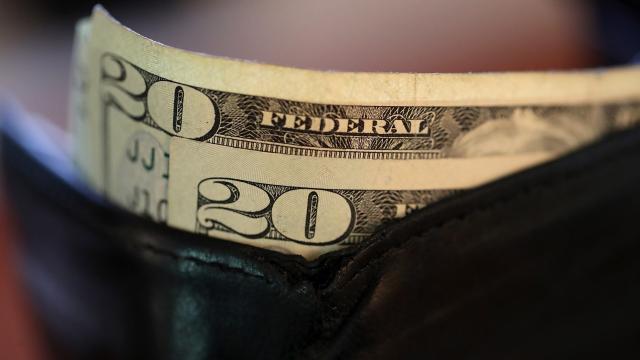Plenty of people around the world, it turns out, are willing to return a stranger’s lost wallet – especially if it’s filled with cash, according to a counterintuitive study.
The study, published in the journal Science on Thursday, was a meticulous social experiment that took three years and over half a million dollars to complete.
A group of 13 research assistants (11 men and 2 women) were recruited for a trip around the world. They travelled to 355 major cities across 40 countries. In each city, they visited banks, theatres, hotels, police stations, and other public spaces and turned in a “lost wallet,” which they claimed to have found on the street, to a nearby employee.
The wallets were all see-through and contained a grocery list written in the country’s primary language, a key, and business cards with a male name and email address where the finder could presumably reach the owner.
Some of the wallets also contained a modest cash sum: an amount roughly to equal $20 in the country’s currency. In three countries specifically – the United Kingdom, Poland, and the United States – some of the wallets had a larger cash bounty of $140, or had the $20 but no key. All told, the team ‘lost’ a whopping 17,000 wallets.
Averaging all the countries together, there was a clear, if counterintuitive result. Fewer than half (40 per cent) of people bothered to contact the wallet’s faux owner when it had no money, but a slim majority (51 per cent) did when they spotted the cash. And for the wallets with $140 inside, an impressive 72 per cent of people tried to return them.
“Why are people more likely to return the wallet when it contains more rather than less money? It’s natural to think it’s simply because people are altruistic and because they care about the owner of the wallet,” study author Christian Lukas Zünd, an economist at the University of Zurich in Switzerland, said at a press conference discussing the findings this week. “Our results suggest it’s a combination of altruism and what we call theft aversion, so aversion to feeling like a thief.”
As support for their theory, the team found that wallets without a key but containing money were reported less often than wallets with both money and a key. The key, likely to be more personally meaningful to the owner, might have motivated more people to act selflessly.
The researchers also conducted another experiment and asked a group of volunteers to imagine how they would react to keeping a lost wallet. Overall, the volunteers said it would have felt more like stealing if the wallets carried money than if they didn’t, and the more money the wallet contained, the more people would have felt like thieves for keeping it.
The team also tried to rule out as many other possible explanations as they could. The list of factors that seemingly didn’t influence people’s willingness to return the wallet included the presence of a security camera or other bystanders where the wallet was returned, whether the country’s laws punished people for holding onto lost property, the age of the recipient who took the lost wallet and whether they were likely a local resident, and the identity of the research assistant who turned the wallet in.
There were, however, differences between the countries themselves. The majority of people living in Switzerland, Norway, and the Netherlands reported the lost wallet, regardless of whether it had money or not.
By contrast, a minority of people in China, Malaysia and Peru returned the wallets in either condition, though the return rate did increase when money was involved. Mexico and Peru were the only two countries where people were less likely to return a wallet with money than one without. The authors don’t have any clear sense of why these countries might be different.
The US, meanwhile, was mediocre in its generosity, ranking 21st in honesty overall. Though again, for the wallets filled with almost a hundred dollars, the return rate among Americans jumped substantially.
As for why these differences exist, the authors speculate that our eagerness to return a lost wallet could very well reflect the local culture surrounding morality and civic responsibility to others.
Countries with a strong social safety net, less financial inequality, and high participation in politics, such as the Nordic countries, might encourage a greater focus on the need to be there for anyone, stranger or not.
Other countries might instead celebrate a culture of strong ties to family or close friends, which is often linked to higher levels of religiosity, or have a government with greater corruption and less democratic involvement by citizens. And sure enough, in the study, it was the countries with the former qualities that saw the highest rates of wallets returned.
Still, the authors warned, these are only correlations. But if our propensity to return a lost wallet really does indicate just how altruistic and moral we can be to strangers, then maybe we’re not as awful a species as we think we are. At the very least, we might be underestimating our collective willingness to do the right thing.
In two other experiments run by the team, they surveyed an online sample of Americans (299 volunteers in total) as well as US economists (279 in total), asking them to predict just how often people would return a wallet containing no money, $20, or $140.
Both groups wrongly predicted that more people would keep the wallets if they came with cash, though the economists were slightly more accurate in their predictions.
The team’s experiments were mostly meant to study and establish a method to measure civic honesty, the authors said. But the fact that regular people and even experts were off base with their cynical predictions could have broader implications.
If we aren’t nearly as heartless as we assume ourselves to be, for instance, then there might be ways to boost our sense of social altruism even more.
